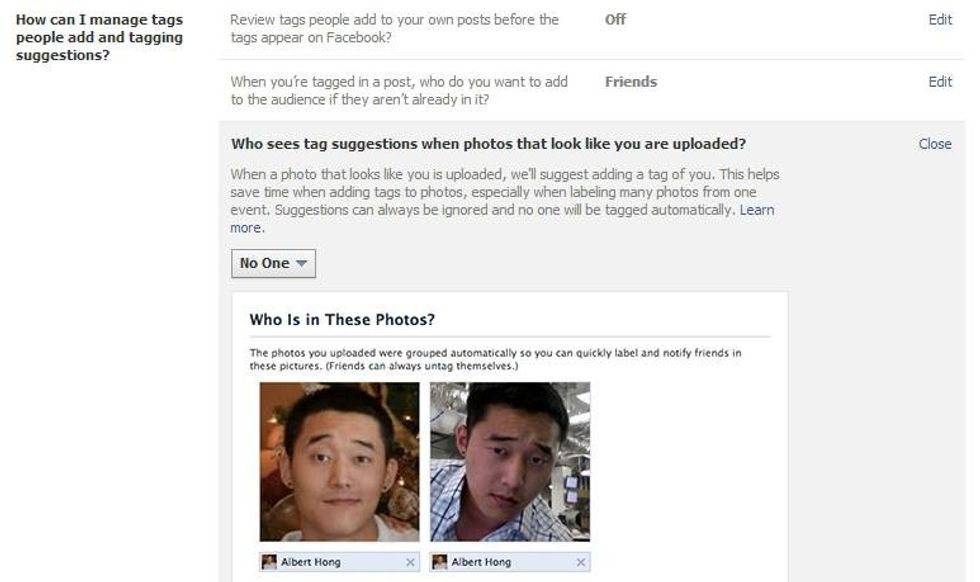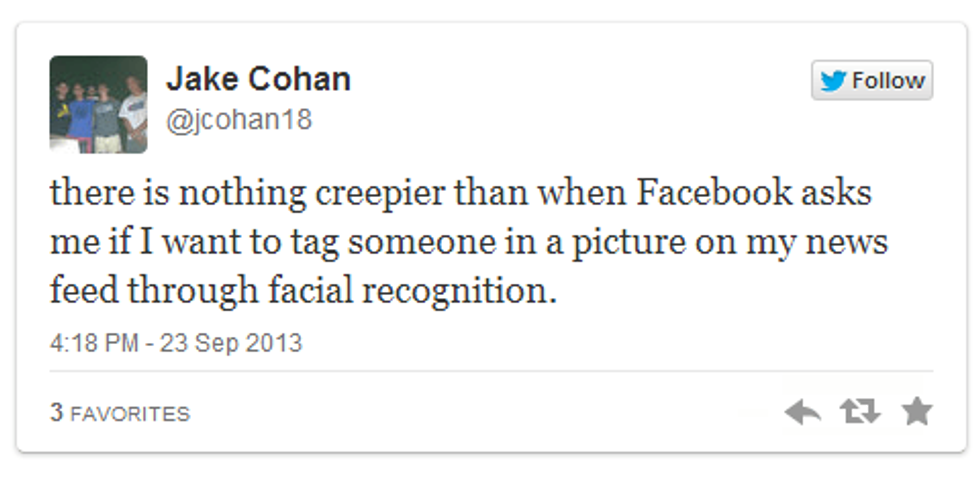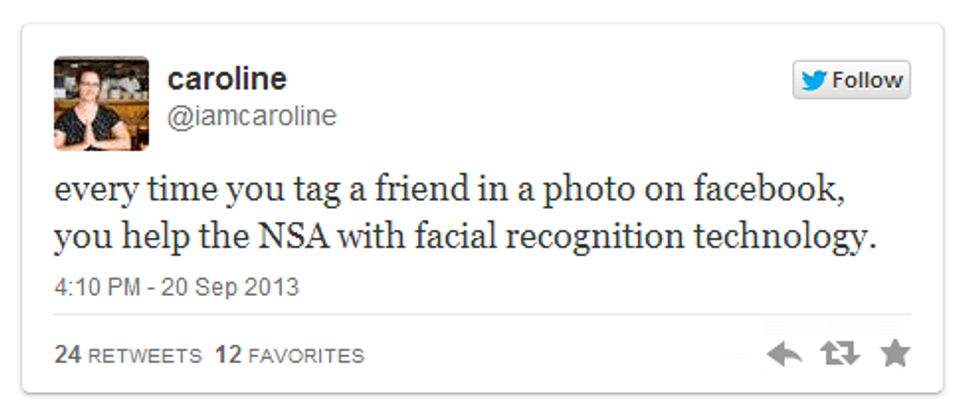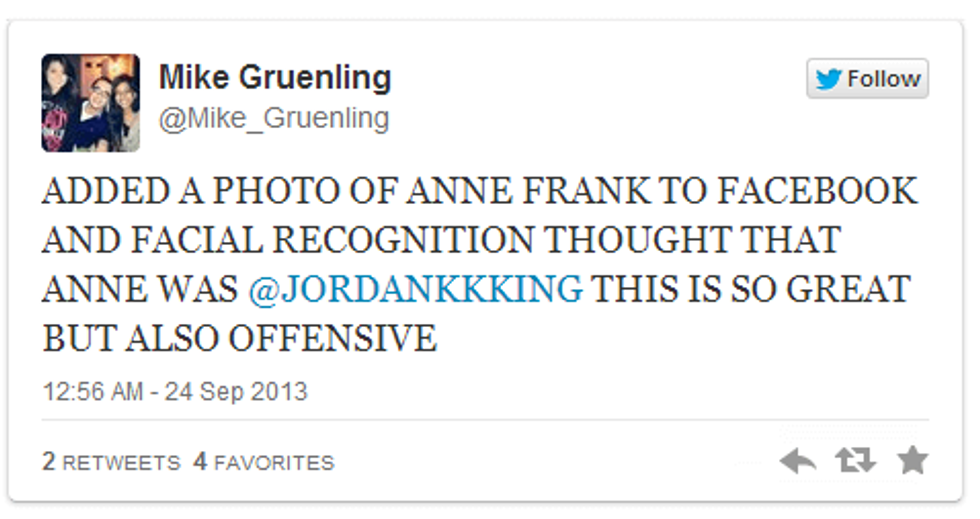
How Marketers Could Use Facebook's Facial Recognition to Stalk Customers
Facebook’s new feature automatically tags friends on their behalf, whether they like it or not.
This new facial recognition technology “facilitates tagging so that people know when there are photos of them on our service," said Facebook Chief Privacy Officer Erin Egan regarding the new feature.
Even though most people agree that automated tagging is not desirable, this feature could be a step closer to making Facebook a more powerful marketing tool.
Marketers, daydream about this idea for a second:
Facebook owns billions of pictures with tons of brands either purposely or inconspicuously in them. According to recent statistics, Facebook users upload over 300 million photos each day, leaving behind over 90 billion photos stored in their database. Imagine if Facebook could all of a sudden “flip the switch” and pinpoint the brands appearing in these pictures across markets and geographic locations. Envision if Facebook could hashtag whenever a picture includes a brand to uncover how that information translates to sales.
This information could be golden for marketers struggling to understand how their target customers interact with their brands and products. This kind of consumer insight can finally give marketers enough data to justify their marketing investments on Facebook. Automatically hashtagging photos can help marketers develop a more accurate sentiment analysis by observing happiness, satisfaction, or even anger. Real-time monitoring of a brand’s level of engagement is an up-and-coming metric that can really put marketers on the map.
With Facebook’s facial recognition, marketers could now confirm not only target demographics, but how customers spend their time, live their lives, and interact with their brands everyday, generating true lifestyle insights. Facial recognition can also give marketers a way to see live trends and alternative uses of their products so they can use this information to compete more effectively.
Although marketers will benefit greatly, users have valid concerns. The social media giant reported that the government has made 38,000 data requests to pull detailed user information. This report was released when the NSA scandal came into full fruition to clear any doubt about Facebook’s role in facilitating secret intelligence.
Now more than ever, people are concerned with their online privacy. Users don’t like to reveal things about themselves or their whereabouts to other Facebook users. Plus, almost everybody has issues with an unflattering picture tagged on Facebook without permission.
Egan tells the Los Angeles Times that tagging will actually improve privacy because it will offer an automatic way for users to police which photos are being posted of themselves.
It’s important that Facebook listen to its user base because they aren't necessarily thrilled about the new feature. Although this tool could be incredibly beneficial for marketers (who pay the bills), clearCi gathered comments surfacing about Facebook’s facial recognition to find a few interesting bits of insight for sharing.
This is what Facebook users are saying about the feature on Twitter:
The majority of Twitter mentions indicate that the new tagging feature is flat out creepy.
Because of the creepiness associated with Facebook's new technology, Irish and German regulators recently backlashed. Facebook has since agreed to disable facial recognition for users across Europe.
Another large group of Tweets were about privacy concerns, specifically targeting the controversial NSA scandal.
This user, for example, believes that every time someone posts a picture on Facebook, they are supporting the NSA with facial recognition technology.
clearCi also found that Facebook’s facial recognition might not be politically correct, or correct across the board. This user uploaded a historic picture of icon Anne Frank and Facebook tagged someone else instead. Woops! Another angry user calls Facebook’s feature “racist” for mixing up his African-American friend with another user of the same race. clearCi also found a few articles, like this one, reiterating that none of these facial recognition technologies are very reliable yet.
For users who feel uncomfortable giving Facebook the right to tag any of their photos to its database, opting out is an option. For now, all users are automatically signed up for this feature by default and must choose NOT to be recognized.
In order to opt out, users can go to their Privacy Settings and manually get rid of this Big Brother feature. This is a sneaky move by Facebook since many users may not know that this feature is already running or inevitably forget to opt out.
Opt Out Tutorial:
- Click on the circular gear icon at the top right right of Facebook’s homepage.
- Select Privacy Settings from the menu.
- On the left-hand side, select Timeline and Tagging.
- Look for the question: Who sees tag suggestions when photos that look like you are uploaded? To opt out, select No One. That way, only you will have the right to tag your own pictures.

This is one way to keep your pictures private, at least from Facebook, for now.
clearCi will continue to use its competitive intelligence software to keep track of the market’s reaction to Facebook’s facial recognition technology. It’ll be interesting to see what Facebook does to meet the demands of both its advertisers and everyday Facebookers. It may be the case that marketers and Facebook users continue struggling to coexist happily ever after.
About the Author
Post by : Emmanuel Trenche
Emmanuel Trenche is VP of Marketing Communications at clearCi, a competitive intelligence software company that helps businesses get the insights to they need to compete. Emmanuel has served as Diversity Chair for the Greater Fort Lauderdale Advertising Federation, and has substantial experience in B2B marketing by working for brands like Wachovia, AT&T and Ecopetrol out of Bogotá, Colombia.
Company: clearCi North America Inc
Title: VP of Marketing Communications
Website: www.clearci.com






